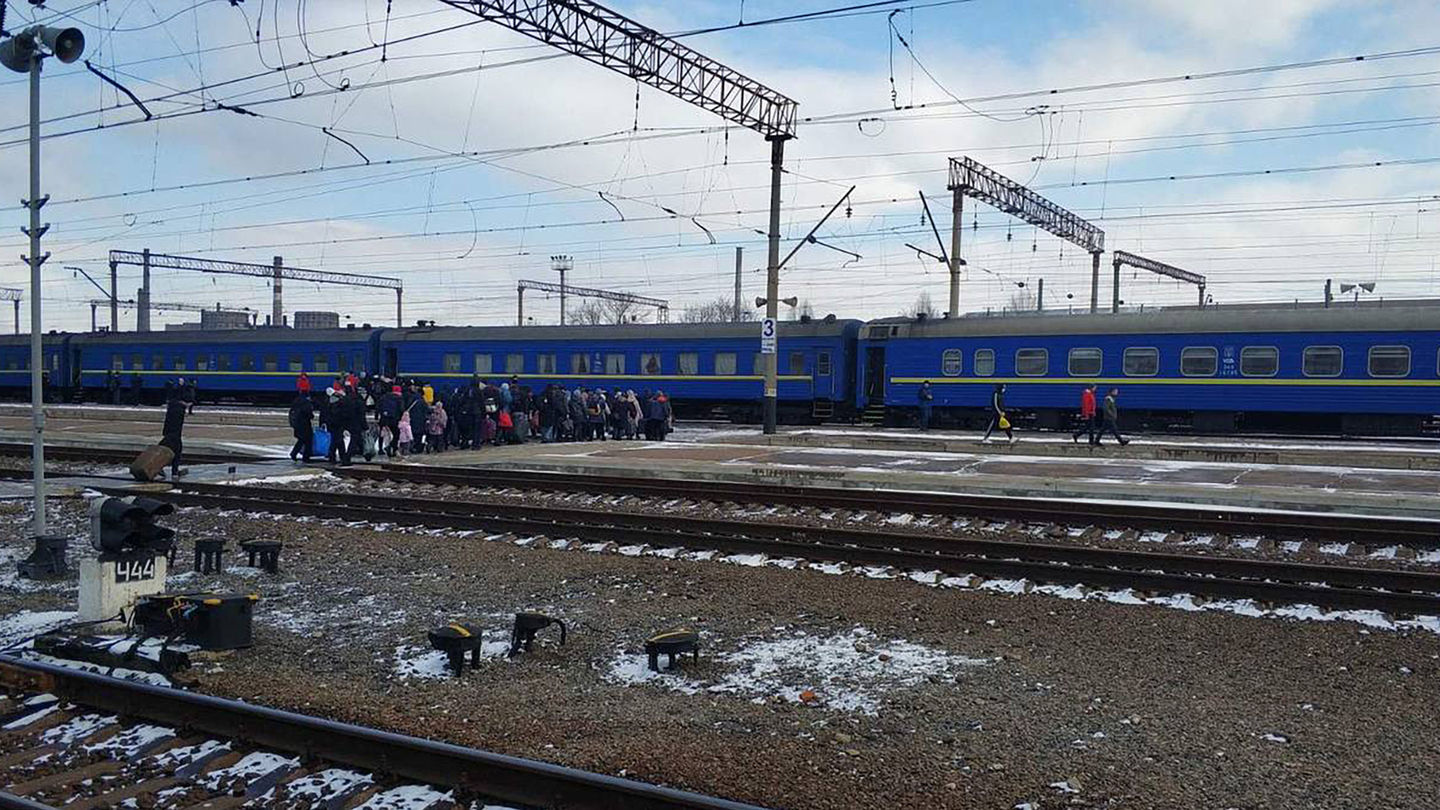Train from Kramatorsk to Germany (Photo by Natalia)
INTRODUCTION
In late summer 2022, nine Ukrainian students embarked on a trip to Japan. The war in Ukraine had devasted the country as citizens abandoned routines for safety. Since Russia’s invasion of Ukraine, it had displaced 10 million citizens, that included three million refugees into surrounding countries.[1] According to topuniversities.com, many of those displaced were university students.[2]
Temple University, Japan Campus (TUJ) decided to support these students, with additional funding through international and non-governmental organizations. TUJ is providing a one-year scholarship, stipend and dormitory accommodation for nine students.
TUJ appointed a committee to select and review applications for the scholarship. Students were selected based on their academic standing and their English language proficiency.
The TUJ Communications team had interviews with these students. The students shared their stories, their hopes and aspirations, and what they expected to achieve through this experience. What follows is the first of a series about the experiences of these Ukrainian students in Japan. Upcoming stories will include their first impressions of Japan, studies at TUJ, cultural adaptation, and ways they intended to contribute to rebuilding Ukraine.
Series 1
The Evacuation from Ukraine ‘A Constant Search for Safety’
Nine Ukrainian students came to Japan. They faced dangers, homelessness and financial hardship in Ukraine. Some were already refugees in neighboring European countries. It was the first time that most had been away from home, made decisions on their own, or traveled on an airplane.
Two university students fled the bombings with their families and escaped to neighboring countries from their hometowns. Karina was studying business at Sumy State University. Natalia was studying journalism at Kyiv National University of Culture and Arts when the bombing started. Neither knew what would happen to them.
Fast Decision-making Led to Survival
The day before the invasion, February 23, 2022, Karina Chevhuz saw military vehicles removed from a cadet school near her house. Russian soldiers came on February 24th. The city of Sumy, in the northeast part of the country, is adjacent to Russia. This proximity unsettled its residents, especially when the bombing started. The city had military academies which made it a target. Karina knew immediately that her family had to get out of there, fast.
Her family hid in their bathroom, the only room without windows, then in the basement, and then to other areas around Sumy. Her friends were texting her about leaving the city.
“I hadn’t eaten for the first two days. Only snacking. The bombings started at 5 a.m. in large cities and we saw soldiers at 2 p.m. We saw tanks out our window,” she said.
She convinced her mother and grandmother to leave with her. They headed to Helsinki, Finland, where her mother knew people who could help them. Her mother gave up her job at an insurance office and decided to evacuate.
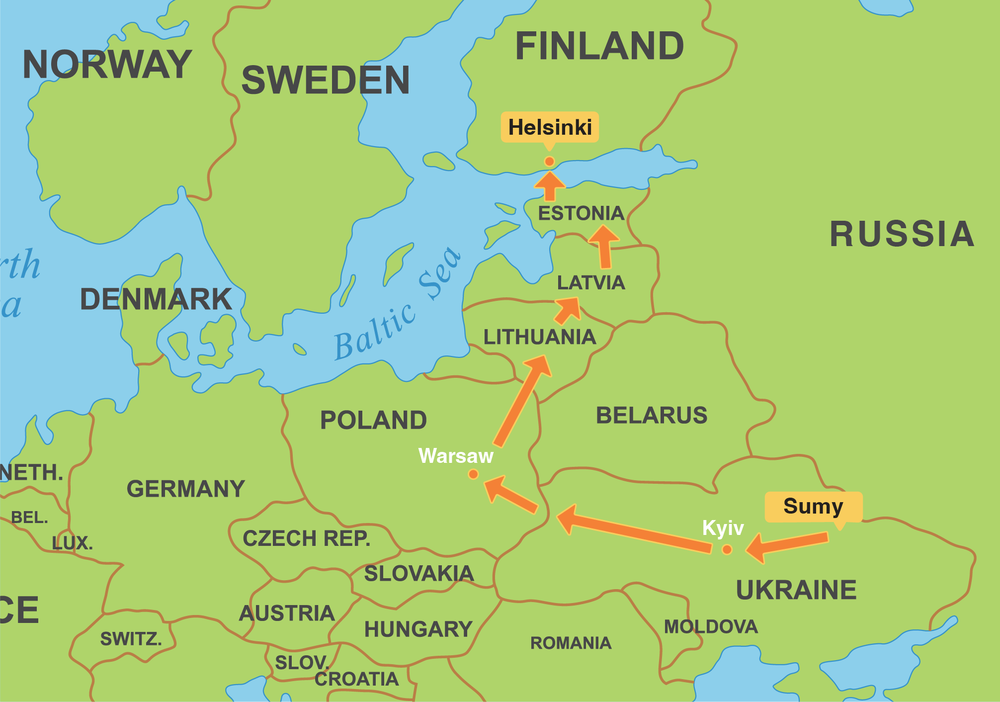
The family took buses and trains from Sumy to Helsinki. On the three-day-long trip they passed through Kyiv, Ukraine; Warsaw, Poland; Lithuania; Latvia; and Estonia. They then took a 3-hour ferry to Helsinki. They traveled away from the dangerous Russian border.
In Helsinki, Karina and her family stayed in a house with 20 people; there were many children. The environment made studying and attending online classes with her school in Ukraine difficult. There was no quiet space for her. They lived in Helsinki for six months and worked there during that time.
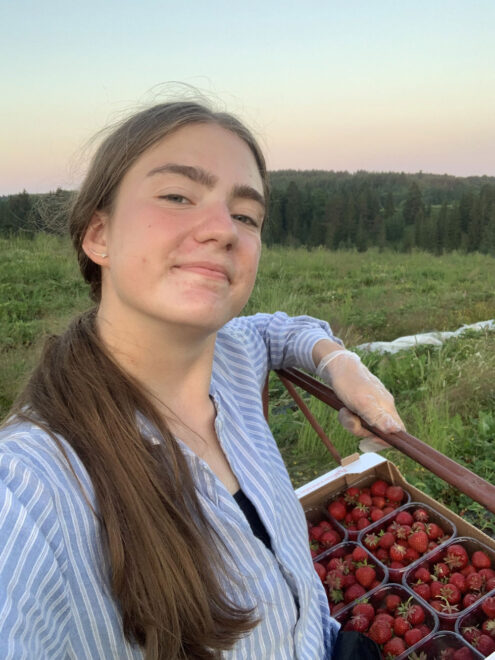
Karina worked on a strawberry farm, sometimes very early to late nights till 10 p.m. Her highest daily earnings were 200 Euros, the minimum monthly wage in Ukraine. The farm paid her per kilogram, which was a good deal for her rather than the hourly wage, set as 9 Euros per hour. Karina said,
“The average salary in Finland is much higher than in Ukraine, so it was possible to earn enough money to live on.”
She made friends and started to have fun too. The days flew by quickly. Picking strawberries was like a competition because her earnings depended on it. Karina explained,
“You had to do it fast because it was a competition. We had a row. I had one side of this row and another person had the other side. You had to pick as fast as you could and not allow the person on the other side to pick the strawberries on your side. It was a real competition. Maybe it was why the days went by so fast; I wanted to pick more, to pick fast. It was a type of game.”
New Destination to Far East ー From Europe to Japan
Natalia remembered when war began with Russia in 2014. They invaded Crimea and occupied her town of Kramatorsk for four months. When the war began on February 24, 2022, she knew that the country was under a second round of Russian attacks. She thought it would end in a few days. Once, her family hid for ten hours in their bathroom. Over the next few weeks, the explosions continued. When bombings came closer to their house, her father insisted that Natalia and her mother leave the country and go to Germany.
“Every part of Ukraine is dangerous,” Natalia said.
Natalia, a student at Kyiv National University of Culture and Arts majoring in journalism, wanted to remain in Ukraine. She was interested in Media Studies and wanted to finish her degree. The war took away her opportunity to live in Ukraine and continue her studies. She had to leave home, but Ukraine and Ukrainians remained in her heart.
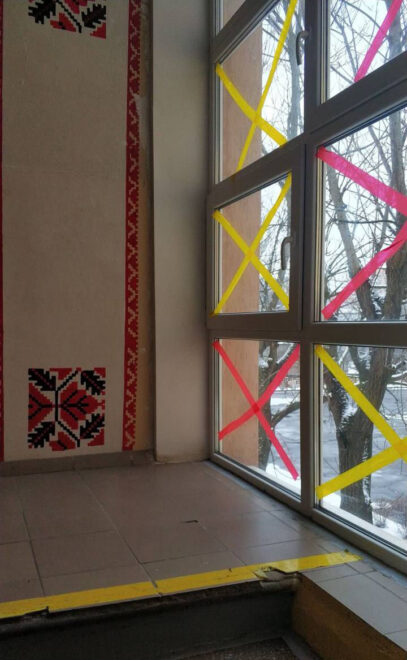 Her father communicated by social media and found a place they could stay in Germany. They boarded a packed train. All she had was her laptop and the clothes she was wearing. They arrived in Berlin from Poland and continued their trip.
Her father communicated by social media and found a place they could stay in Germany. They boarded a packed train. All she had was her laptop and the clothes she was wearing. They arrived in Berlin from Poland and continued their trip.
Ukraine has an extensive railway system, offering short distance and long-distance travel. The train Natalia and her mother took was a compartment train. There were four bunk beds in each compartment, intended for a family of four. On Natalia’s trip, the compartment held fourteen people, including children and dogs packed into the small space. They had few provisions. No meals were included on the 36-hour trip. The two of them shared 300 milliliter water rations, usually a size for one person. She wished for better times. According to Natalia,
“Ukraine’s railway system has helped millions flee to safer places, even as its stations and other infrastructure are targeted.”
Natalia continued, “The train was carrying us west, to safer areas of Ukraine.”
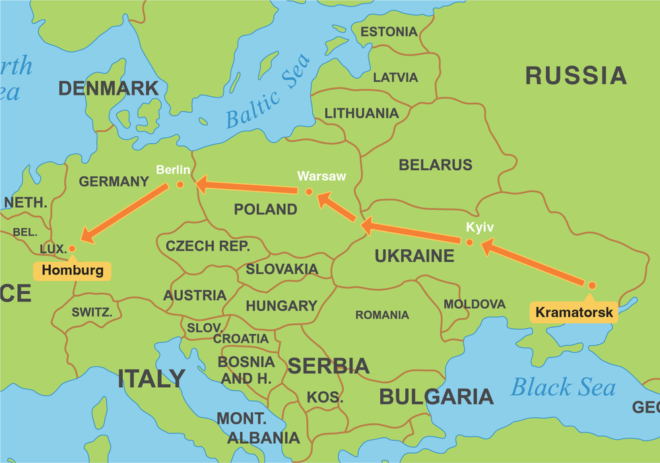
She also stated that she did not know the train’s direction or its final destination. The train changed direction based on the safety situation. When there was a siren, the train stopped and waited, then moved to the next location.
“There were lots of stops. I didn’t know the final destination and would only understand when we arrived and found accommodations,” she said.
Natalia found comfort knowing Germany was a safe place for her family. She stayed in Germany for five months in a small border town called Homburg. After a month under the bombing and sirens in Ukraine, it was hard for her to acclimatize to the peace and quiet in Germany.
She reflected,
“I could not understand what happened. Every day, I woke up afraid.”
She dreamed about Ukraine every day and wanted to return every moment. She knew she could not leave because she had the language skills to help her family.
While she continued her Ukrainian education online, she also had to study German. The German government required a German Integration Course for Ukrainians, who received temporary protection there.
“It was a mandatory class 4 hours a day, 5 days a week for Ukrainians.”
Natalia did not want to live there longer than necessary. She wanted to continue her studies and started to search the internet for scholarship opportunities during her free time. Most of the scholarships were for science majors, not creatives like her. Natalia had not intended to apply to a program in Japan but was willing to explore every opportunity.
“I think I applied a day before the deadline. I have never thought about Japan because it is so far from Europe. The deadline was so close but I thought I must try.”
Natalia completed the simple application. Shortly after submitting it, she received an acceptance message from Temple University, Japan Campus.
“Congratulations, you have won a scholarship from Japan.”
Natalia later remarked,
“It was an unbelievable morning. It was the biggest surprise of the last several months. It changed my life.”
Natalia thought Japan was so distant from her physically and emotionally that at first, she thought it might be a scam. She conducted an internet search for the person in charge and Dean Wilson to ensure they were real people at a real university. It took her three days to tell her parents. She knew everything was fine after meeting online with TUJ Dean Wilson and the team. Speaking with them made Natalia comfortable heading to Japan.
“It was like a light shining from darkness,” she said.
She was leaving Germany and going to Japan!
Along with other Ukrainian students, Natalia and Karina have comfortably settled into their school routines and love their dormitory. They find the city exceptionally clean, with quiet subways. Natalia described Tokyo as another planet “that looks amazing.” Karina was excited to walk the Shibuya crossing she had only seen in a documentary and said Tokyo’s skyscrapers “inspired her.” Both Karina and Natalia are getting used to the life in Tokyo, taking fall semester classes and doing well.
[1] Jake Epstein (2022, March 19) Business Insider The number of Ukrainians displaced by Russia’s invasion has swelled to nearly 10 million, UN agencies say https://www.businessinsider.com/un-nearly-10-million-ukrainians-displaced-by-russian-invasion-2022-3
[2] Craig O (2022, March 24) QS Top Universities Which universities are offering support to students displaced by the Ukraine crisis? https://www.topuniversities.com/student-info/university-news/which-universities-offering-support-students-displaced-ukraine-crisis
Written by Elizabeth Gaskin (TUJ Communication Studies Major) and TUJ Communication and Marketing Support Department
Other related stories
- TUJ Participates in Joint News Conference on a Scholarship Program for Ukrainian Students (June 20, 2022)
- Temple University, Japan Campus to Provide Academic Assistance and Financial Support to Ukrainian Students (June 3, 2022)

